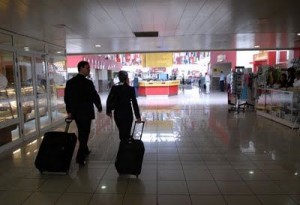 The Cuban surgeon stepped into the cibercafe in the city of Banjul. After a few minutes, he got in touch with the US Embassy in Gambia. “I’m a Cuban doctor who wants to go to the United States. When can we meet?”, he said.
The Cuban surgeon stepped into the cibercafe in the city of Banjul. After a few minutes, he got in touch with the US Embassy in Gambia. “I’m a Cuban doctor who wants to go to the United States. When can we meet?”, he said.
In the awaited answer, he was ordered to go to the local market to contact a blond lady dressed in green. The diplomat would provide him with the keys for the desertion.
This story is not a casual one, and will happen again and again with other people, even more if we believe the words of Victoria Nuland, spokesperson for the United States Department of State. The same day the Decree-Law No. 302, which modifies the Cuban Migration Law was released, Nuland forecasted that there wouldn’t be “any change in the content” of the US legislation toward our country.
As it is pointed out in the above mentioned decree-law, the US government hinders the international health cooperation and continues to foster the brain-drain with political purposes. Suffice it to visit the website of the US Department of State, and read the announcement of the Cuban Medical Professional Parole Program (CMPP).
Without the slightest diplomatic caution, that exclusively designed-for-Cuba “legal” migration mechanism, offers special treatment in American embassies for Cuban health co-operators, who would be allowed to travel to the United States in an almost expeditious way.
The CMPP, godson of the Cuban Adjustment Law and the Dry-Feet-Wet Feet policy, was born in 2006 from US military intelligence colonel Emilio Gonzalez, the then Director of United States Citizenship and Immigration Services (2005-2008). Gonzalez didn’t need to say much to get his proposal approved by President George W. Bush.
An Europa Press report perfectly portrays the ideological genes of who also served as major consultant on Cuban issues for the Council of National Security (2001-2002). “Guantanamo (the naval base) is the only place in Cuba where human rights are respected”, said Mr. Gonzalez.
The current businessman called himself before El Nuevo Herald as the “final referee” for the desertion applications. “There are cases on how doctors were taken out from remote regions that deserved to be filmed (…); some of them had to make several stopovers to arrive in the United States, and we had to be sure that there were people monitoring the cases in each of the stopovers (…)”, he added.
A Wikileaks cable dated 2009 from the US Embassy in Venezuela, puts away all conjectures on the political stock of the CMPP, which focuses not only on fostering desertion (related with undermining the prestige of the Cuban Revolution), but also on sabotaging the Mision Barrio Adentro (Barrio Adentro Mission), born in 2003.
As it is stated in the website of the solidarity project Cubainformación, it is not accidental that most desertions are reported in Venezuela. This is the country where most Cuban health co-operators are sent thanks to an agreement signed between the two nations. Likewise, we should make reference to the so-called Mision Barrio Afuera (Barrio Afuera Mission), encouraged by the Solidaridad sin Fronteras (Solidarity without Borders) organization, based in Miami, under the protection of Washington.
According to José Luis Méndez, author of the book La Operación Cóndor contra Cuba (The Condor Operation agsint Cuba), “the CMPP program has acquired a mafia style; the desertion of the Cuban doctors who fulfil missions in Venezuela is regularly encouraged and managed by Ileana Ros-Lehtinen, via mechanisms found in Colombia”.
In a scenario where the major media silence the solidarity epic of Cuba, there are plenty of reports that reveal the strong interest of the United States to politicize the migration of our professionals, in order to demonize the Revolution. That attitude goes beyond the selective character of the “brain-drain”, said Ileana Sorolla Fernández, director of the Center for Studies of International Migrations, in the University of Havana. When attending a Mesa Redonda TV program, Sorolla said that the 80% of the Cuban migration is settled in the United States; but this phenomenon dates back to the XIX century.
Experts underline the economic ones as the major reasons for Cubans to go and live somewhere else. But in the case of the health workers, this decision raises doubts about their ethical and moral qualities.
Aris Fortain Espinosa, head of the Medical Cooperation Department at the Provincial Health Offices in Sancti Spiritus, confirmed Escambray about the desertion from mission of a very small number of locals. This behaviour is similar to the figure reported nationwide, less than 2% of the co-operators, according to a Cubainformación article published in 2011.
The effect of CMPP has reached the Camilo Cienfuegos Provincial Hospital, said its director Dr. Manuel Rivero, who questions the decision of some specialists not to come back, without taking into consideration the financial resources invested by the State in their professional training, for which they haven’t payed a single penny.
While the country makes its migration policy more flexible, hostile Washington stands its grounds, and has done nothing to revoke the five programs of immigrant visas which are suitable for Cubans, like the CMPP. That is why, unfortunately, there will always be a doctor to dial the number of this of that US embassy to say: Please, I’m a Cuban doctor…
(Translated by Escambray)
 Escambray ENGLISH EDITION
Escambray ENGLISH EDITION





Escambray reserves the right to publish comments.